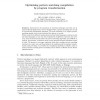Free Online Productivity Tools
i2Speak
i2Symbol
i2OCR
iTex2Img
iWeb2Print
iWeb2Shot
i2Type
iPdf2Split
iPdf2Merge
i2Bopomofo
i2Arabic
i2Style
i2Image
i2PDF
iLatex2Rtf
Sci2ools
ECEASST
2006
2006
Optimizing Pattern Matching Compilation by Program Transformation
Motivated by the promotion of rewriting techniques and their use in major industrial applications, we have designed Tom: a pattern matching layer on top of conventional programming languages. The main originality is to support pattern matching against native data-structures like objects or records. While crucial to the efficient implementation of functional languages as well as rewrite rule based languages, in our case, this combination of algebraic constructs with arbitrary native data-structures makes the pattern matching algorithm more difficult to compile. In particular, well-known many-to-one automaton-based techniques cannot be used. We present a two-stages approach which first compiles pattern matching constructs in a naive way, and then optimize the resulting code by program transformation using rewriting. As a benefit, the compilation algorithm is simpler, easier to extend, and the resulting pattern matching code is almost as efficient as best known implementations.
Conventional Programming Languages | ECEASST 2006 | Major Industrial Applications | Native Data-structures |
Related Content
| Added | 12 Dec 2010 |
| Updated | 12 Dec 2010 |
| Type | Journal |
| Year | 2006 |
| Where | ECEASST |
| Authors | Emilie Balland, Pierre-Etienne Moreau |
Comments (0)

